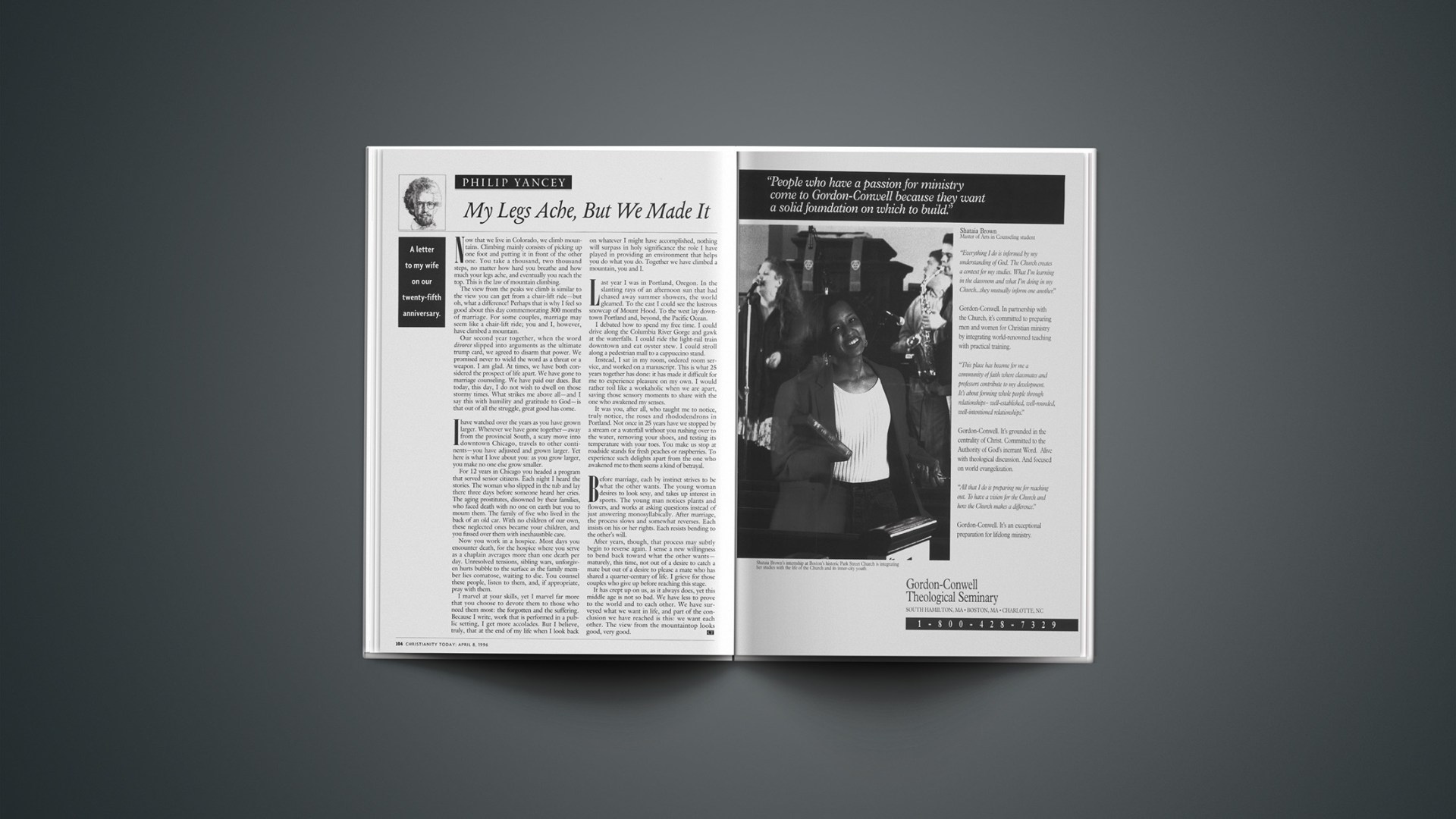Now that we live in Colorado, we climb mountains. Climbing mainly consists of picking up one foot and putting it in front of the other one. You take a thousand, two thousand steps, no matter how hard you breathe and how much your legs ache, and eventually you reach the top. This is the law of mountain climbing.
The view from the peaks we climb is similar to the view you can get from a chair-lift ride—but oh, what a difference! Perhaps that is why I feel so good about this day commemorating 300 months of marriage. For some couples, marriage may seem like a chair-lift ride; you and I, however, have climbed a mountain.
Our second year together, when the word divorce slipped into arguments as the ultimate trump card, we agreed to disarm that power. We promised never to wield the word as a threat or a weapon. I am glad. At times, we have both considered the prospect of life apart. We have gone to marriage counseling. We have paid our dues. But today, this day, I do not wish to dwell on those stormy times. What strikes me above all—and I say this with humility and gratitude to God—is that out of all the struggle, great good has come.
I have watched over the years as you have grown larger. Wherever we have gone together—away from the provincial South, a scary move into downtown Chicago, travels to other continents—you have adjusted and grown larger. Yet here is what I love about you: as you grow larger, you make no one else grow smaller.
For 12 years in Chicago you headed a program that served senior citizens. Each night I heard the stories. The woman who slipped in the tub and lay there three days before someone heard her cries. The aging prostitutes, disowned by their families, who faced death with no one on earth but you to mourn them. The family of five who lived in the back of an old car. With no children of our own, these neglected ones became your children, and you fussed over them with inexhaustible care.
Now you work in a hospice. Most days you encounter death, for the hospice where you serve as a chaplain averages more than one death per day. Unresolved tensions, sibling wars, unforgiven hurts bubble to the surface as the family member lies comatose, waiting to die. You counsel these people, listen to them, and, if appropriate, pray with them.
I marvel at your skills, yet I marvel far more that you choose to devote them to those who need them most: the forgotten and the suffering. Because I write, work that is performed in a public setting, I get more accolades. But I believe, truly, that at the end of my life when I look back on whatever I might have accomplished, nothing will surpass in holy significance the role I have played in providing an environment that helps you do what you do. Together we have climbed a mountain, you and I.
Last year I was in Portland, Oregon. In the slanting rays of an afternoon sun that had chased away summer showers, the world gleamed. To the east I could see the lustrous snowcap of Mount Hood. To the west lay downtown Portland and, beyond, the Pacific Ocean.
I debated how to spend my free time. I could drive along the Columbia River Gorge and gawk at the waterfalls. I could ride the light-rail train downtown and eat oyster stew. I could stroll along a pedestrian mall to a cappuccino stand.
Instead, I sat in my room, ordered room service, and worked on a manuscript. This is what 25 years together has done: it has made it difficult for me to experience pleasure on my own. I would rather toil like a workaholic when we are apart, saving those sensory moments to share with the one who awakened my senses.
It was you, after all, who taught me to notice, truly notice, the roses and rhododendrons in Portland. Not once in 25 years have we stopped by a stream or a waterfall without you rushing over to the water, removing your shoes, and testing its temperature with your toes. You make us stop at roadside stands for fresh peaches or raspberries. To experience such delights apart from the one who awakened me to them seems a kind of betrayal.
Before marriage, each by instinct strives to be what the other wants. The young woman desires to look sexy, and takes up interest in sports. The young man notices plants and flowers, and works at asking questions instead of just answering monosyllabically. After marriage, the process slows and somewhat reverses. Each insists on his or her rights. Each resists bending to the other’s will.
After years, though, that process may subtly begin to reverse again. I sense a new willingness to bend back toward what the other wants—maturely, this time, not out of a desire to catch a mate but out of a desire to please a mate who has shared a quarter-century of life. I grieve for those couples who give up before reaching this stage.
It has crept up on us, as it always does, yet this middle age is not so bad. We have less to prove to the world and to each other. We have surveyed what we want in life, and part of the conclusion we have reached is this: we want each other. The view from the mountaintop looks good, very good.
Copyright © 1996 Christianity Today. Click for reprint information.










